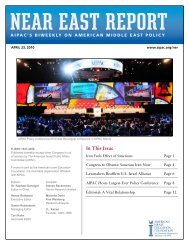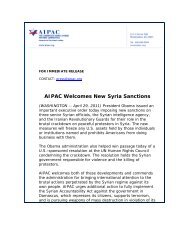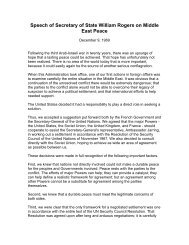2013 Briefing Book - Print Version - Aipac
2013 Briefing Book - Print Version - Aipac
2013 Briefing Book - Print Version - Aipac
You also want an ePaper? Increase the reach of your titles
YUMPU automatically turns print PDFs into web optimized ePapers that Google loves.
SYRIA-LEBANON<br />
Hizballah Serves as Iran’s Proxy Along Israel’s Border<br />
A half-decade after the end of the 2006 war between Israel and Hizballah, the terrorist group has<br />
rebounded. With the support of Iran and Syria, Hizballah flagrantly violates U.N. Security Council<br />
Resolution 1701, which established a cease-fire and called for Hizballah’s disarmament. Instead,<br />
Hizballah has amassed a stockpile of more than 60,000 rockets and mortars, including hundreds of<br />
advanced guided rockets capable of hitting all of Israel. U.S. officials, including former Secretary of<br />
Defense Robert Gates, have said that Hizballah’s military capabilities now dwarf those of many nations.<br />
As the leading state sponsor of terrorism, Iran utilizes Hizballah to export its revolutionary ideology<br />
and promote terrorism. Together, Iran and Hizballah have built alliances with narcotics traffickers<br />
in Latin America and terrorist groups throughout the Middle East, including Iraqi insurgents who<br />
regularly attacked U.S. forces when they were in Iraq.<br />
By providing sophisticated weapons to Hizballah in the aftermath of the 2006 war, Iran has<br />
blatantly violated numerous Security Council resolutions, including U.N. Security Council<br />
Resolution 1747, which forbids Iran from exporting or trading weapons. The Islamic Revolutionary<br />
Guards Corps (IRGC)—itself a designated terrorist organization—provides Hizballah with training,<br />
weapons and millions of dollars each year.<br />
Syria Helps Hizballah Advance Military Capabilities<br />
Syria serves as a transit point for Iranian weapons and provides its own military and technical support<br />
to Hizballah. In the view of American and Israeli defense officials, Syrian-Hizballah ties have advanced<br />
during the past five years to the point that the Syrian leadership views Hizballah as an extension of its<br />
own military. Syria has provided top-shelf weapons systems such as M600 missiles and late-generation<br />
Scud missiles from its own arsenal to the terrorist group. Both missiles have a range of 150 to 250<br />
miles and can target Israel’s main population centers. Top Israeli and American officials have accused<br />
Syria of transferring approximately 100 M600s and at least 10 Scud-D missiles to the terrorist group,<br />
according to a WikiLeaks report picked up by The New York Times in December 2010. The transfer<br />
constitutes a destabilizing escalation by the Assad regime.<br />
Hizballah Aids Syrian Repression of Its People<br />
As the civil war in Syria raged throughout 2012, Hizballah was cited by Syrian rebels as playing<br />
an increasing role in helping the regime. Syrian rebels reported Hizballah sniper teams operating in<br />
Damascus, Hama and Homs, and often assisting the “shabiha” regime gangs that terrorize towns and<br />
166








